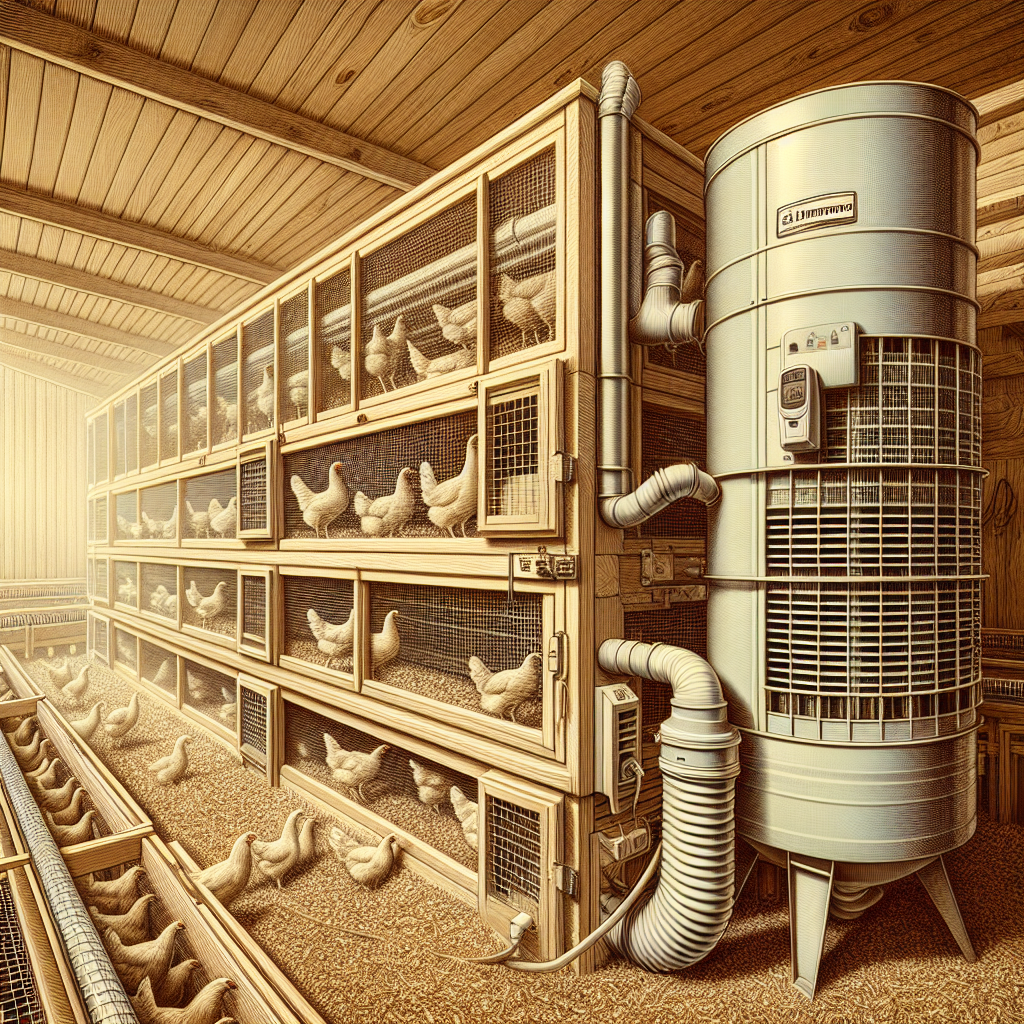In this article, you’ll discover the importance of proactive maintenance in preventing common coop issues. From ensuring regular inspections to implementing preventive measures, taking a proactive approach can save you time, money, and unnecessary stress. By addressing potential problems before they worsen, you’ll maintain a healthy and functional coop for your feathered friends. So, let’s explore the key ways you can stay ahead of any potential coop issues and keep your poultry happy and safe.
Identifying Common Coop Issues
Understand the Importance of Proactive Maintenance
As a cooperative housing community, it is crucial to recognize the significance of proactive maintenance in preventing common coop issues. By staying on top of regular maintenance tasks, you can identify and address potential problems before they escalate into major issues. Taking a proactive approach not only saves you time and money in the long run but also ensures the safety and well-being of all residents.
Potential Risks in Cooperative Housing
There are several potential risks that cooperative housing communities may face if maintenance is neglected. One of the most common risks is structural problems, which can compromise the integrity of the entire building. Plumbing and electrical concerns can also arise, leading to leaks, blockages, and hazardous situations. HVAC systems can malfunction, causing discomfort for residents. Roofing problems, such as leaks and water damage, are another common issue. Pest infestations can pose health hazards and damage property. Exterior maintenance issues, such as weather-related damage, can affect the aesthetics and functionality of the building. Resident safety and security can be compromised if security systems and access controls are not properly maintained. Neglecting common areas and amenities can lead to dissatisfaction among residents. Lastly, budgeting for cooperative maintenance is essential to avoid deferred maintenance issues that may result in costly repairs.
The Consequences of Ignoring Maintenance Issues
If maintenance issues in a cooperative housing community are ignored or not properly addressed, there can be severe consequences. Neglected structural problems can lead to compromised safety, with the risk of collapsing walls or floors. Plumbing leaks and blockages can cause water damage, mold growth, and even structural decay. Electrical system failures can result in fire hazards and electrical shocks. Inefficient HVAC systems can lead to discomfort, decreased air quality, and increased energy costs. Roofing problems can result in costly repairs, water infiltration, and compromised insulation. Pest infestations can spread diseases and damage property. Damaged exterior surfaces and unattended weather-related damage can affect the appearance and functionality of the building. Inadequate security measures may leave residents vulnerable to theft and other dangers. Neglected common areas and amenities can lead to decreased satisfaction among residents and a decline in the community’s overall appeal. Deferred maintenance issues can become more expensive to address over time and may even require extensive renovations or replacements.
Preventing Structural Problems
Regular Inspections to Identify Weak Spots
Regular inspections play a vital role in preventing structural problems in cooperative housing. These inspections should be conducted by qualified professionals who can assess the condition of the building and identify any potential weak spots or vulnerabilities. By catching issues early on, necessary repairs or reinforcements can be made to prevent further damage and ensure the safety of residents.
Addressing Foundation and Structural Integrity
The foundation is the backbone of any building, and its integrity must be maintained to prevent serious structural problems. Regular inspections should include a thorough examination of the foundation, looking for signs of cracks, settling, or damage. If issues are identified, prompt repairs should be undertaken to prevent further deterioration. It is also important to address any structural concerns promptly, such as sagging floors or walls, as these can indicate underlying problems that, if left unattended, can lead to significant damage.
Monitoring and Maintaining Load-Bearing Walls
Load-bearing walls are crucial for the stability and strength of a cooperative housing building. Regular monitoring and maintenance of these walls are necessary to ensure their soundness. Any signs of cracking, shifting, or other structural issues must be addressed immediately by qualified professionals. Reinforcements and repairs can prevent catastrophic failures and keep the building structurally sound for the long term.
Mitigating Plumbing and Electrical Concerns
Preventive Measures to Avoid Plumbing Leaks and Blockages
Plumbing leaks and blockages can cause significant damage and inconvenience in cooperative housing communities. To prevent these issues, proactive measures should be taken. Regular inspections of plumbing systems, pipes, and fixtures can help identify potential problems early on. Additionally, routine maintenance tasks such as drain cleaning, pipe insulation, and checking for leaks can mitigate the risk of plumbing issues. Educating residents on proper usage and disposal practices can also contribute to preventing blockages and leaks.
Maintenance of Wiring and Electrical Systems
Electrical systems pose risks if not properly maintained. Regular inspections of wiring, outlets, and electrical panels should be performed to identify any signs of wear, damage, or potential hazards. Flickering lights, tripping breakers, or overheating outlets are warning signs that should not be ignored. Timely maintenance can prevent electrical malfunctions, such as power outages or electrical fires, and ensure the safety of residents.
Ensuring Fire Safety in Cooperative Buildings
Fire safety should be a top priority in cooperative housing. Regular inspections of fire alarms, smoke detectors, and fire suppression systems are crucial to ensure their proper functioning. It is also essential to periodically check emergency exits and keep them clear of obstructions. Conducting fire drills and providing fire safety education to residents can help minimize the risk of fire-related emergencies. Maintenance of fire safety equipment, such as fire extinguishers and sprinkler systems, should be performed according to manufacturer recommendations and local regulations.
Ensuring HVAC Efficiency and Function
Regular Maintenance of Heating Systems
Heating systems in cooperative housing communities should undergo regular maintenance to ensure optimal efficiency and functionality. This includes cleaning or replacing filters, inspecting and lubricating motors, checking thermostat accuracy, and assessing overall system performance. Routine maintenance not only prevents unexpected breakdowns but also helps extend the lifespan of heating equipment and reduces energy consumption.
Preventing Air Conditioning Failures
With summers getting hotter, air conditioning failures can be a major inconvenience in cooperative housing. Regular maintenance is key to prevent such failures. Cleaning or replacing air filters, checking refrigerant levels, inspecting condenser coils, and ensuring proper airflow are essential tasks for maintaining efficient and functional air conditioning systems. Timely maintenance can help identify and address minor issues before they escalate into major breakdowns, keeping residents comfortable even on the hottest days.
Maintaining Ventilation and Air Quality
Proper ventilation and air quality are vital for the health and well-being of cooperative housing residents. Regular maintenance of ventilation systems, such as cleaning air ducts and changing filters, can promote better indoor air quality. Monitoring humidity levels and taking preventive measures against mold growth can also contribute to healthier living conditions. Additionally, maintaining proper ventilation in common areas and shared spaces helps prevent the buildup of stale air and odors.
Safeguarding against Roofing Problems
Regular Roof Inspections and Repairs
Regular roof inspections play a crucial role in identifying potential roofing problems in cooperative housing communities. A professional roofer should conduct inspections at least once a year, checking for signs of damage, leaks, or wear. Timely repairs and maintenance tasks, such as patching up minor leaks or replacing damaged shingles, can prevent costly water damage and prolong the lifespan of the roofing system.
Preventing Water Damage and Leaks
Water damage is one of the most common and expensive issues faced by cooperative housing communities. Regular maintenance and proactive measures can help prevent water infiltration and leaks. Proper gutter and downspout maintenance, including regular cleaning and repairs, can ensure the efficient drainage of rainwater and prevent clogs that lead to overflow. Regularly inspecting the flashing around chimneys, vents, and skylights can also identify potential areas of vulnerability and address them before they become significant issues.
Maintaining Roofing Materials for Longevity
The longevity of the roofing materials is heavily dependent on regular maintenance. Different types of roofing materials require specific maintenance tasks, such as cleaning, sealing, or treating for moss and algae growth. It is essential to follow manufacturer guidelines and recommendations for maintaining the roofing materials used in the cooperative housing. Regular inspections and maintenance can extend the lifespan of the roof and minimize the need for costly replacements.
Addressing Pest Infestations
Proactive Measures to Prevent Pest Infestations
Prevention is key when it comes to pest infestations in cooperative housing communities. Implementing proactive measures, such as regular cleaning and decluttering, sealing any potential entry points, and ensuring proper waste management, can significantly reduce the risk of pests. Regular inspections by professional pest control services can also detect early signs of infestation and prevent the spread of pests throughout the community.
Effective Pest Control Strategies
In the unfortunate event of a pest infestation, it is crucial to have effective pest control strategies in place. Engaging professional exterminators who specialize in cooperative housing can help address the issue promptly and effectively. A combination of targeted treatments, such as baiting and trapping, along with preventive measures, can help eliminate pests and prevent future infestations. Educating residents about proper food storage, cleanliness, and pest prevention practices can also contribute to long-term pest control success.
Collaborating with Professional Exterminators
Cooperative housing communities should establish a collaboration with professional exterminators who have experience in dealing with pest control in similar settings. Regular inspections and ongoing communication with these professionals can help identify potential problem areas and develop proactive pest control strategies. It is essential to work together to create an integrated pest management plan tailored to the specific needs and challenges of the cooperative housing community.
Managing Common Exterior Maintenance Issues
Regular Cleaning and Maintenance of Exterior Surfaces
Maintaining clean and well-maintained exterior surfaces enhances the overall appearance and curb appeal of cooperative housing communities. Regular cleaning of walls, windows, and other surfaces can prevent the buildup of dirt, grime, and mold. Pressure washing or soft washing techniques can be used to remove stubborn stains and maintain the aesthetic appeal of the building. Additionally, regular inspections should be performed to identify and address any structural issues or damage to the exterior surfaces promptly.
Landscaping and Grounds Upkeep
A well-manicured and properly maintained landscape adds value to cooperative housing communities. Regular landscaping tasks, such as mowing, pruning, and fertilizing, should be carried out to keep the grounds looking attractive and inviting. Regular inspections of trees and shrubs can detect signs of disease or potential hazards, ensuring the safety of residents. Adequate irrigation systems and drainage should also be maintained to prevent waterlogging or erosion issues.
Dealing with Weather-related Damage
Weather-related damage can occur in cooperative housing communities, and it is important to address it promptly. Regular inspections after severe weather events, such as storms or heavy rains, can help identify any damage to the exterior surfaces, roofs, or landscaping. Timely repairs should be made to prevent further deterioration and avoid costly repairs in the future. It is also crucial to have a plan in place for emergency situations, such as severe storms or hurricanes, to protect the cooperative housing community and its residents.
Promoting Resident Safety and Security
Upkeep of Security Systems and Access Controls
Resident safety and security should be a top priority in cooperative housing communities. Regular maintenance and inspections of security systems, such as CCTV cameras, alarm systems, and access controls, are essential to ensure their proper functioning. Any issues or malfunctions should be promptly addressed by qualified professionals to maintain a secure environment for residents.
Ensuring Well-lit Common Areas and Walkways
Adequate lighting in common areas and walkways contributes to resident safety and security. Regular inspections should be carried out to identify any faulty or malfunctioning lights and replace them promptly. Ensuring a well-lit environment during nighttime hours reduces the risk of accidents, deters potential threats, and increases overall comfort and peace of mind for residents.
Implementing Safety Measures for Emergency Situations
Cooperative housing communities should have safety measures in place to address emergency situations. Regular maintenance and inspections of emergency exits, fire extinguishers, and evacuation routes are crucial to ensure their functionality. Conducting regular drills and providing residents with information on emergency procedures can save lives and minimize injuries during critical situations. Collaboration with local emergency services and maintaining up-to-date contact information is also essential for quick response in case of emergencies.
Maintaining Common Areas and Amenities
Regular Cleaning and Maintenance of Shared Spaces
Common areas and shared spaces in cooperative housing communities should be regularly cleaned and maintained to create a pleasant living environment for residents. Regular cleaning tasks, such as vacuuming, dusting, and sanitizing, should be performed in common areas such as lobbies, corridors, and lounges. Adequate waste management systems should be in place, ensuring timely removal of trash and recyclables. Routine inspections should also be conducted to identify any maintenance or repair needs in these areas.
Repairing and Updating Common Amenities
Common amenities, such as fitness centers, swimming pools, or community rooms, should be properly maintained and periodically updated to meet the needs and expectations of residents. Regular inspections should be conducted to identify any malfunctioning equipment, damaged facilities, or potential safety hazards. Repairs should be carried out promptly, and regular maintenance tasks, such as cleaning and servicing, should be performed to ensure the longevity and functionality of these amenities.
Providing Adequate Parking and Storage Facilities
Cooperative housing communities should provide adequate parking and storage facilities for their residents. Regular maintenance of parking lots and garages, such as resealing cracks, repainting lines, and ensuring proper lighting, contributes to a safe and convenient parking experience. Storage facilities, such as lockers or bike racks, should also be regularly inspected and maintained to meet residents’ storage needs.
Budgeting for Cooperative Maintenance
Allocating Sufficient Funds for Ongoing Maintenance
Proper budgeting is crucial to ensure the ongoing maintenance needs of a cooperative housing community are met. When allocating funds, it is essential to prioritize maintenance projects, taking into account the criticality and urgency of each task. Sufficient funds should be allocated to cover routine maintenance tasks, inspections, and necessary repairs. By setting aside adequate funds, cooperative housing communities can avoid deferred maintenance issues and costly emergency repairs in the future.
Prioritizing and Planning Maintenance Projects
Prioritizing maintenance projects ensures that critical issues are addressed promptly and efficiently. Routine inspections help identify areas that require immediate attention, such as structural problems or safety concerns. By creating a maintenance schedule and planning projects in advance, cooperative housing communities can effectively allocate resources and minimize disruptions for residents. Collaboration with maintenance professionals and contractors can provide valuable insights on project prioritization and planning.
Avoiding Deferred Maintenance Issues
Deferred maintenance occurs when necessary maintenance tasks are postponed or neglected, leading to more significant problems down the line. Cooperative housing communities should avoid deferring maintenance to prevent costly repairs and potential risks. By adopting a proactive maintenance approach and addressing issues promptly, cooperative housing communities can maintain the overall value and integrity of the property while ensuring the safety and satisfaction of residents.
In conclusion, cooperative housing communities can prevent common coop issues through proactive maintenance strategies. By understanding the importance of proactive maintenance, identifying potential risks, and addressing maintenance issues promptly, cooperative housing communities can maintain the integrity of their structures, avoid plumbing and electrical concerns, ensure HVAC efficiency and function, safeguard against roofing problems, address pest infestations, manage exterior maintenance issues, promote resident safety and security, maintain common areas and amenities, and budget effectively for ongoing maintenance. By following these practices, cooperative housing communities can create a safe, comfortable, and enjoyable living environment for all residents.




